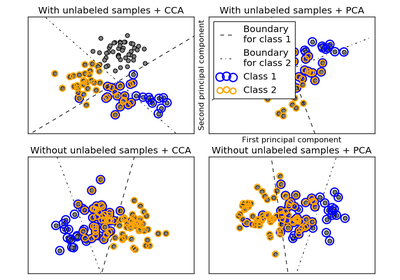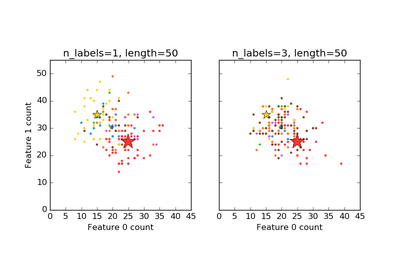sklearn.datasets.make_multilabel_classification¶
-
sklearn.datasets.make_multilabel_classification(n_samples=100, n_features=20, n_classes=5, n_labels=2, length=50, allow_unlabeled=True, sparse=False, return_indicator='dense', return_distributions=False, random_state=None)[source]¶ Generate a random multilabel classification problem.
- For each sample, the generative process is:
- pick the number of labels: n ~ Poisson(n_labels)
- n times, choose a class c: c ~ Multinomial(theta)
- pick the document length: k ~ Poisson(length)
- k times, choose a word: w ~ Multinomial(theta_c)
In the above process, rejection sampling is used to make sure that n is never zero or more than n_classes, and that the document length is never zero. Likewise, we reject classes which have already been chosen.
Read more in the User Guide.
Parameters: n_samples : int, optional (default=100)
The number of samples.
n_features : int, optional (default=20)
The total number of features.
n_classes : int, optional (default=5)
The number of classes of the classification problem.
n_labels : int, optional (default=2)
The average number of labels per instance. More precisely, the number of labels per sample is drawn from a Poisson distribution with
n_labelsas its expected value, but samples are bounded (using rejection sampling) byn_classes, and must be nonzero ifallow_unlabeledis False.length : int, optional (default=50)
The sum of the features (number of words if documents) is drawn from a Poisson distribution with this expected value.
allow_unlabeled : bool, optional (default=True)
If
True, some instances might not belong to any class.sparse : bool, optional (default=False)
If
True, return a sparse feature matrixNew in version 0.17: parameter to allow sparse output.
return_indicator : ‘dense’ (default) | ‘sparse’ | False
If
densereturnYin the dense binary indicator format. If'sparse'returnYin the sparse binary indicator format.Falsereturns a list of lists of labels.return_distributions : bool, optional (default=False)
If
True, return the prior class probability and conditional probabilities of features given classes, from which the data was drawn.random_state : int, RandomState instance or None, optional (default=None)
If int, random_state is the seed used by the random number generator; If RandomState instance, random_state is the random number generator; If None, the random number generator is the RandomState instance used by np.random.
Returns: X : array of shape [n_samples, n_features]
The generated samples.
Y : array or sparse CSR matrix of shape [n_samples, n_classes]
The label sets.
p_c : array, shape [n_classes]
The probability of each class being drawn. Only returned if
return_distributions=True.p_w_c : array, shape [n_features, n_classes]
The probability of each feature being drawn given each class. Only returned if
return_distributions=True.



